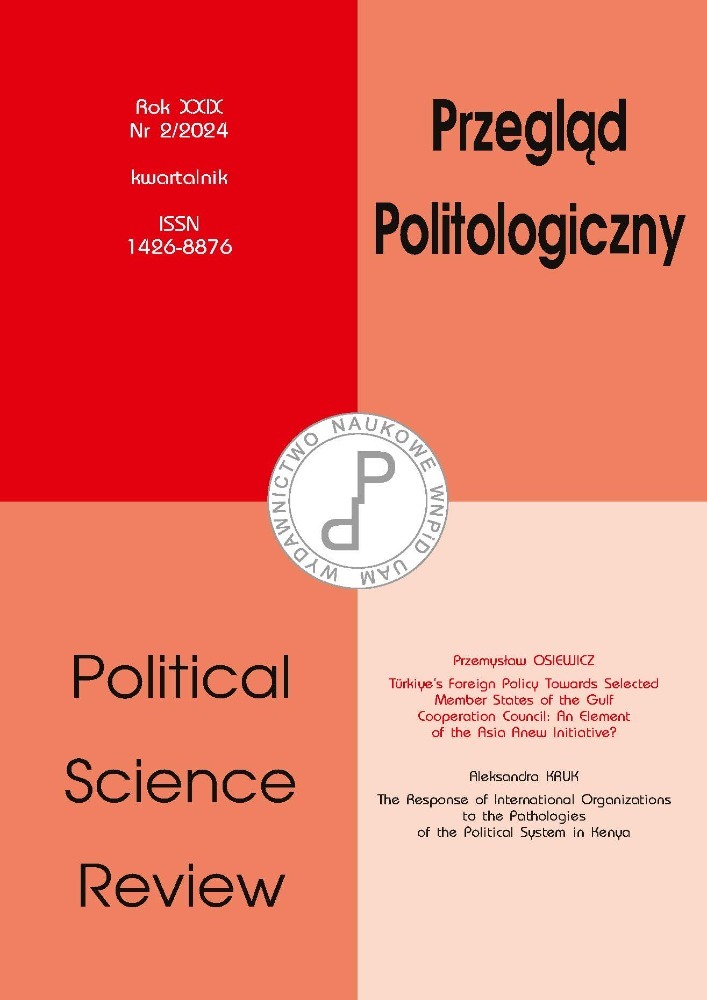Abstrakt
Celem artykułu jest zbadanie przyczyn i konsekwencji zmian w polityce zagranicznej Turcji wobec państw członkowskich Rady Współpracy Zatoki Perskiej po 2021 roku. Główna hipoteza badawcza zakłada, że zmiana polityki Turcji wobec GCC ma prawdopodobnie charakter pragmatyczny i ma na celu pozyskanie środków finansowych. Jako taka stanowi jedynie element tureckiej Inicjatywy Asia Anew, czyli nowego podejścia w relacjach z różnymi partnerami azjatyckimi, określanego także czasem mianem zwrotu ku Azji. Jednocześnie nie jest to element politycznej, długoterminowej strategii Turcji wobec regionu Bliskiego Wschodu. W artykule przedstawiona została autorska definicja pragmatycznego podejścia do polityki zagranicznej państwa.
Bibliografia
Asia Anew Initiative (2023), Ministry of Foreign Affairs of Türkiye, https://www.mfa.gov.tr/asia-anew-initiative.en.mfa, 17.11.2023.
Bakir A. (2023), Turkey’s security role in the Gulf region: exploring the case of a newcomer, “Turkish Studies”, vol. 24, no. 5. DOI: https://doi.org/10.1080/14683849.2023.2182686
Cochran M. (2012), Pragmatism and International Relations: A Story of Closure and Opening, “European Journal of Pragmatism and Amercian Philosophy”, vol. 4, no. 1. DOI: https://doi.org/10.4000/ejpap.777
Creswell J. W. (2009), Research Design: Qualitative, Quantitative, and Mixed Methods Approaches, Thousand Oaks–London.
Davutoğlu A., Interview with Turkey’s Foreign Minister Ahmet Davutoğlu: “Turkey Creates Balance in the Middle East”, 21.04.2010, Qantara.de, https://qantara.de/en/article/interview-turkeys-foreign-minister-ahmet-davuto%C4%9Flu-turkey-creates-balance-middle-east, 13.11.2023.
Davutoğlu A. (2012), Stratejik Derinlik. Türkiye’nin Uluslararası Konumu, Küre Yayınları, Istanbul.
Erdoğan meets Qatari emir in Doha: In a joint statement, the two countries marked 50 years of diplomatic relationships (2023), https://bianet.org/haber/erdogan-meets-qatari-emir-in-doha-281699, 20.11.2023.
Fuller G. E. (2014), Turkey and the Arab Spring: Leadership in the Middle East, Bozorg Press.
Göksel O. (2015), The Impact of the Arab Spring on Turkey’s Role and Relations in the Middle East, in: Turkish Foreign policy in the New Millenium, eds. H. Işıksal, O. Örmeci, Peter Lang, Frankfurt am Main.
Günay D. (2017), The Roles Turkey Played in the Middle East (2002–2016), in: Turkish Foreign Policy: International Relations, Legality and Global Reach, ed. P. Gözen Ercan, Palgrave Macmillan, Cham. DOI: https://doi.org/10.1007/978-3-319-50451-3_10
Karataş I. (2023), Erdogan in the Gulf: Strengthening Economic Ties and Navigating Regional Politics, Gulf International Forum, https://gulfif.org/erdogan-in-the-gulf-strengthening-economic-ties-and-navigating-regional-politics/, 21.11.2023.
President Erdoğan welcomed with official ceremony in Qatar (2023), https://www.tccb.gov.tr/en/news/542/147808/president-erdogan-welcomed-with-official-ceremony-in-qatar, 20.11.2023.
Treisman R., 5 years after Khashoggi’s murder, advocates say the lack of justice is dangerous, 2.10.2023, NPR, https://www.npr.org/2023/10/02/1202937036/jamal-khashoggi-mbs-murder-saudi-arabia-human-rights, 17.11.2023.
Turkey’s Erdogan arrives in Saudi Arabia to kick off Gulf tour, 17.07.2023, Aljazeera, https://www.aljazeera.com/news/2023/7/17/turkeys-erdogan-arrives-in-saudi-arabia-to-kick-off-gulf-tour, 21.11.2023.
Tür Ö. (2013), Turkey’s Changing relations with the Middle East: New Challenges and Opportunities in the 2000s, in: Debating Security in Turkey: Challenges and Changes in the Twenty-first Century, ed. E. Canan-Sokullu, Lexington Books, Lanham.
Türkiye, Qatar to enhance bilateral relations after Erdoğan visit, 18.07.2023, “Daily Sabah”, https://www.dailysabah.com/politics/diplomacy/turkiye-qatar-to-enhance-bilateral-relations-after-erdogan-visit, 28.11.2023.
Türkiye, Qatar strengthen ties through joint statement, 19.07.2023, “Hűrriyet Daily News”, https://www.hurriyetdailynews.com/erdogan-visits-qatar-as-part-of-gulf-tour-184821, 28.11.2023.
Licencja
Prawa autorskie (c) 2024 Przemysław Osiewicz

Utwór dostępny jest na licencji Creative Commons Uznanie autorstwa – Na tych samych warunkach 4.0 Miedzynarodowe.

